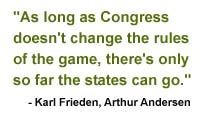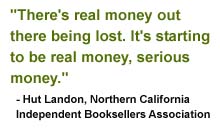|
Setback for e-tax backers
|
 |
September 26, 2000: 5:29 p.m. ET
California governor vetoes sales tax measure; other states mull their options
By Staff Writer Steve Bills
|
NEW YORK (CNNfn) - Although California's governor vetoed legislation that would tax certain Internet sales, the issue is likely to resurface, experts say.
"The issue is going to keep recirculating around the country," said Karl Frieden, director of Arthur Andersen's state and local tax practice and author of the book "CyberTaxation: The Taxation of e-Commerce."
"A number of other states are likely to try to do what California did," he said.
 Gov. Gray Davis vetoed the California tax measure on Monday, saying the measure "singles out companies that are conducting transactions electronically and attempts to impose tax-collection obligations on them to which, according to California courts, they are not subject." Gov. Gray Davis vetoed the California tax measure on Monday, saying the measure "singles out companies that are conducting transactions electronically and attempts to impose tax-collection obligations on them to which, according to California courts, they are not subject."
He said, however, the state should look at the issue again, and he signed legislation to create a commission to study tax policy in the new economy.
"Large stores who can move their online operations out of state should not be able to retain a loophole allowing them to avoid collecting sales taxes," complained Assemblywoman Carole Migden (D-San Francisco), the lead sponsor of the vetoed bill. She intends to reintroduce the legislation next year to keep the issue alive, a spokesman said.
A rule for 'bricks and clicks' merchants
"A lot of states were likely to follow their lead," had California gone after the sales tax revenue represented by "bricks and clicks" e-merchants, those that have physical stores as well as Internet sales, Frieden said. The "split decision," with approval by the Democratic legislature over Republican opposition, then a veto by the Democratic governor, could slow movement in other states, he suggested.
One such effort kicks into gear next week. The "simplified sales tax project," a pilot program sponsored by the National Governors Association, will enable four states to test software from several different vendors in an attempt to make such taxes -- now a confusing patchwork of state and local levies -- easier to administer.
"As long as Congress doesn't change the rules of the game, there's only so far the states can go," Frieden said. Under existing interstate commerce rules, retailers are not legally responsible for collecting taxes on out-of-state sales, an old mail-order rule that has taken on a whole new meaning in the Internet age.
Booksellers pushed California measure
The California bill had been propelled by the support of independent bookstore owners, who said they were put at an unfair disadvantage by competition from Internet operations like Barnesandnoble.com (BNBN: Research, Estimates) and the Borders.com division of Borders (BGP: Research, Estimates).
 Those e-tailers particularly drew the ire of conventional bookstores, because their real-world counterparts have physical stores and other facilities in California. The booksellers argued this creates a legal "nexus" for the companies, making them liable to collect taxes on their sales. Those e-tailers particularly drew the ire of conventional bookstores, because their real-world counterparts have physical stores and other facilities in California. The booksellers argued this creates a legal "nexus" for the companies, making them liable to collect taxes on their sales.
The leading Internet merchant, Amazon.com (AMZN: Research, Estimates), would not have been affected by the California law because it has no physical facilities in California, noted Hut Landon, executive director of the Northern California Independent Booksellers Association.
Landon said other real-world merchants with online presence -- such as Macys.com, REI.com and EddieBauer.com -- already collect taxes on California sales through their Web sites, but the book merchants don't.
'Real money being lost'
"We were looking to close up a tax loophole," Landon said, pointing out that customers can return Web-ordered merchandise to the e-tailers' physical stores and that the stores promote the Web sites, making them function as a single business even though they are legally structured as separate companies. "There's real money out there being lost. It's starting to be real money, serious money."
As a member of the Booksense.com network of local book merchants, Landon noted that fulfillment of sales from his Marin County shop is handled out of New York state, so perhaps he shouldn't pay California taxes for his own online sales.
"I don't believe in that philosophy," Landon said. "But I also have a responsibility to my booksellers to look at all the options, and that is an option." 
|
|
|
|
|
 |

|

